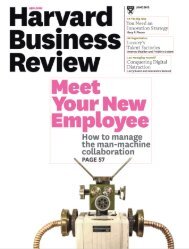+ + +
You also want an ePaper? Increase the reach of your titles
YUMPU automatically turns print PDFs into web optimized ePapers that Google loves.
LEADERSHIP<br />
Why? Their formative years were heavily influenced<br />
by terrorism and school violence, “inexplicable things<br />
that can happen to anyone anytime,” Erickson says.<br />
“That’s why, in the workplace, they’re constantly asking,<br />
‘Is what you’re asking me to do today meaningful and<br />
important and challenging?’” The best leaders of<br />
Millennials “think of their role as similar to a teacher<br />
preparing lesson plans,” she adds. “What are we<br />
going to accomplish this week, and what will the team<br />
learn? They integrate a learning component with an<br />
executional component.”<br />
Millennials, in fact, have grown up in a more<br />
inclusive, participatory environment than previous<br />
generations. Successful leaders will be those who<br />
evolve toward evaluating task completion rather than<br />
the individual.<br />
“A lot of their schooling was designed around<br />
teamwork,” Erickson says. “They do a lot of their social<br />
activities in groups; they’re very comfortable with that.”<br />
That can lead to conflicts in the workplace, where<br />
traditional corporate cultures have been set up for individual<br />
evaluation. Explains Erickson: “We’re hung up on<br />
assessing individual raw performance. We lose focus on<br />
the fact that collaboration may get the task done better<br />
and smarter than if done by individuals.”<br />
Then there’s the issue of feedback on those tasks.<br />
Continued on page 48<br />
ILLUSTRATION © OLIVER MUNDAY<br />
5 TIPS FOR<br />
LEADING<br />
THE NEW<br />
GENERATION<br />
Emphasize training and<br />
personal development.<br />
Surveys show that Millennial<br />
workers rate training and development<br />
as an employee benefit<br />
three times higher than they<br />
rate cash bonuses. “Put your<br />
training program on steroids if<br />
you want to retain this group.<br />
It’s money that is worthwhile<br />
to invest,” says Amy Lynch of<br />
Nashville-based consulting firm<br />
Generational Edge.<br />
However, this should not<br />
necessarily mean laying<br />
out every facet of a Millennial<br />
employee’s role. Tammy<br />
Erickson, author of Plugged<br />
In: The Generation Y Guide<br />
to Thriving at Work, advises<br />
against “over-specifying.”<br />
“These are people who have<br />
gone through school not necessarily<br />
reading a textbook from<br />
start to finish, but getting a<br />
snippet of information from here<br />
and there on the internet,” she<br />
says. “Give them a challenge<br />
and let them figure it out.”<br />
Encourage collaboration<br />
and transparency.<br />
“The new-era employee<br />
assumes they can and should<br />
contribute to conversation and<br />
decisions that affect where<br />
they work,” says Lisa Orrell<br />
of San Francisco Bay Areabased<br />
consultancy The Orrell<br />
Group and author of Millennials<br />
Incorporated. Meetings should<br />
be open, collaborative sessions<br />
in which everyone is encouraged<br />
to share ideas.<br />
A good leader will know<br />
how to incorporate that input<br />
and channel it. “Switch from<br />
top-down to side-to-side<br />
management,” Lynch says.<br />
“Focus on: ‘Here’s what we<br />
have to get done, let’s figure<br />
out how to get there.’”<br />
Reconsider the schedule.<br />
Many leaders are restructuring<br />
the workweek to accommodate<br />
young people’s stamina<br />
and give them more time to<br />
recharge. “Be more flexible<br />
and try four 10-hour days to<br />
give employees a three-day<br />
weekend. You’ll make your<br />
business a workplace of choice<br />
for Millennials,” Lynch says.<br />
Focus on mentorship.<br />
“Millennials have grown up with<br />
a lot of guidance from their<br />
parents, society and teachers.<br />
They truly value and seek<br />
hand-holding at work,” Orrell<br />
says. “I’ve spoken with many<br />
Millennials who have quit jobs<br />
quickly because they were<br />
promised mentorship but never<br />
received it.”<br />
You may also try reciprocal<br />
mentoring, such as pairing a<br />
smart, tech-savvy Millennial<br />
with a senior exec. “Have the<br />
exec learn social media while the<br />
Millennial learns leadership and<br />
management skills,” suggests<br />
Jeanne Meister, founding partner<br />
of New York-based consultancy<br />
Future Workplace and co-author<br />
of The 2020 Workplace: How<br />
Innovative Companies Attract,<br />
Develop, and Keep Tomorrow’s<br />
Employees Today.<br />
Commit to social causes.<br />
Leaders who prioritize volunteering<br />
and a connection to<br />
social causes are finding success<br />
in attracting and retaining<br />
Gen Yers, many of whom stress<br />
their desire to work for a business<br />
that has a positive impact<br />
on society. Successful leaders<br />
of young people are incorporating<br />
such activities and values<br />
into their business models and<br />
communicating them in compelling<br />
ways. Suggests Lynch:<br />
“Talk about the ways you are<br />
connected to the community,<br />
the ways you make the world a<br />
better place.”<br />
46 ENTREPRENEUR MARCH 2015






